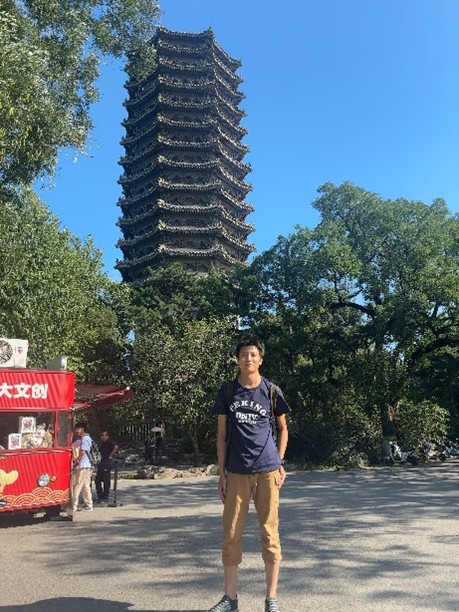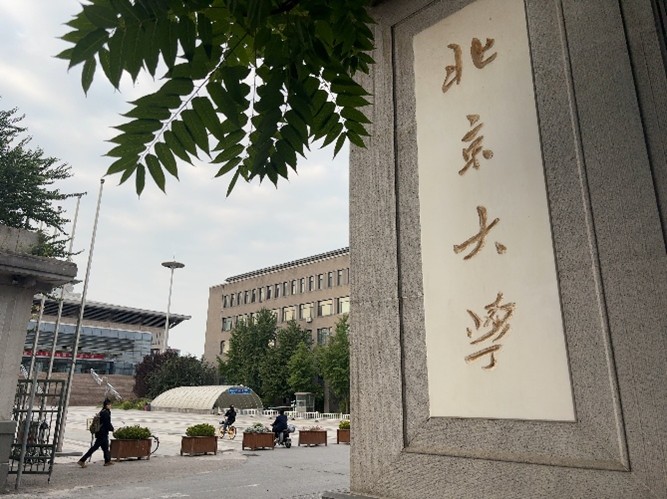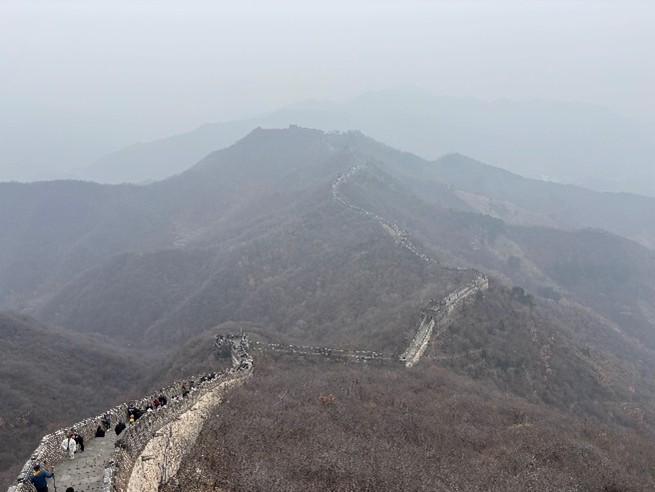Guanghua School of Management, Peking University (China)
Wataru Matsumoto
Exchange Programs
September 2024 - January 2025
Tell us the reason why you decided to join the program.

Peking University Boya Pagoda Tower in the background
From my practical experience in tourism administration, I have always felt the large presence of Chinese tourists in the Japanese tourism market. I believed that understanding Chinese tourists and taking a strategic approach would be extremely important in promoting tourism policy in the future.
In addition, there are many Chinese students at Kyoto University's Graduate School of Management and through my interactions with them, I was aware of the development of the Chinese market and the dynamism of the digital economy, and decided to study in that country to deepen my understanding of the Chinese market, culture, and Chinese tourists.
Peking University's Guanghua School of Management is located in Beijing, the capital of China, which is not only a political city but also a tourist city with many cultural heritages, making it an ideal environment to observe local tourism policies and methods of utilizing cultural resources for actual practice.
Furthermore, I finally decided to study at the graduate school because I believed that the school would offer a high level of lectures with distinguished professors from around the world and an opportunity to deepen my understanding of China's influence in the Asian economy and business.
In addition, there are many Chinese students at Kyoto University's Graduate School of Management and through my interactions with them, I was aware of the development of the Chinese market and the dynamism of the digital economy, and decided to study in that country to deepen my understanding of the Chinese market, culture, and Chinese tourists.
Peking University's Guanghua School of Management is located in Beijing, the capital of China, which is not only a political city but also a tourist city with many cultural heritages, making it an ideal environment to observe local tourism policies and methods of utilizing cultural resources for actual practice.
Furthermore, I finally decided to study at the graduate school because I believed that the school would offer a high level of lectures with distinguished professors from around the world and an opportunity to deepen my understanding of China's influence in the Asian economy and business.
Sample of courses you took
One of the courses I took was a lecture called “Business Chinese,” which was designed for international students to improve their Chinese conversation skills in daily life and business situations, such as answering phones and adjusting schedules. It was a participatory class and helped students deepen their understanding not only of conversational skills but also of Chinese culture and business customs.
In the “Luxury Brand Management” lecture, we explored the strategies of luxury brands, the history and characteristics of various luxury brands through case studies, as well as how to evaluate horizontal and vertical development of brands, and strategies for maintaining and improving brand value through collaboration among brands. That was a great opportunity that enable me to learn all those things from a professor who had been active on the front lines as a manager of luxury brands such as COO of Ralph Lauren and CEO of Balmain with extensive business experience in Europe and Asia..
The lecture also included group presentations, where participants were able to brush up their practical teamwork skills through discussions in multinational teams (Japan, Mainland China, Hong Kong, Germany, Finland, and the U.S.).
In the “Luxury Brand Management” lecture, we explored the strategies of luxury brands, the history and characteristics of various luxury brands through case studies, as well as how to evaluate horizontal and vertical development of brands, and strategies for maintaining and improving brand value through collaboration among brands. That was a great opportunity that enable me to learn all those things from a professor who had been active on the front lines as a manager of luxury brands such as COO of Ralph Lauren and CEO of Balmain with extensive business experience in Europe and Asia..
The lecture also included group presentations, where participants were able to brush up their practical teamwork skills through discussions in multinational teams (Japan, Mainland China, Hong Kong, Germany, Finland, and the U.S.).
Tell us about the classes and research during your study abroad.
The lectures during my study abroad included both those specific to the field of business in China and practical business from a global perspective taught by foreign professors. Especially in the former lectures, there were opportunities to discuss Chinese business practices and how they differ from Western culture.
In addition, the professors were multinational and all lectures were given in English, which allowed the students to deepen their discussions from an international perspective.
In the Global Perspective Business, I researched and obtained data and findings in group work and made a final presentation to share with my professors and classmates, which provided a valuable opportunity to develop thinking skills based on multicultural co-creation.
In addition, the professors were multinational and all lectures were given in English, which allowed the students to deepen their discussions from an international perspective.
In the Global Perspective Business, I researched and obtained data and findings in group work and made a final presentation to share with my professors and classmates, which provided a valuable opportunity to develop thinking skills based on multicultural co-creation.
Tell us about the school’s environment (Facilities, faculty and staff members, students, etc.).

Peking University, East Gate
Peking University's Guanghua School of Management had a large campus, advanced facilities, a reputable faculty, and a diverse student body, making it an environment full of academic stimulation. I had the impression that the graduate school offers many opportunities to interact with other international students through frequent events and activities.
In addition, with several low-cost and diverse dining halls and cafes on campus, a natural environment including Weiming Lake, a library with a large collection of books, and study spaces throughout the campus, I felt that the environment was comfortable both academically and in terms of living, as well as being full of various stimulating factors.
In addition, with several low-cost and diverse dining halls and cafes on campus, a natural environment including Weiming Lake, a library with a large collection of books, and study spaces throughout the campus, I felt that the environment was comfortable both academically and in terms of living, as well as being full of various stimulating factors.
Did you participate in any activities besides lectures and research?

Great Wall of China (Moutainyu Great Wall)
Outside of lectures and research, I actively participated in local networking events and exchange programs for international students. For example, I participated in the one-day tour organized by the graduate school, which gave me the opportunity to see and understand Chinese cultural heritage firsthand.
We also exhibited a booth at a study abroad fair organized by the graduate school to provide information about Kyoto University to local students and to give them advice on studying abroad. At the networking event, I participated in an exchange event between Chinese students studying Japanese and Japanese students studying Chinese in Beijing, which not only improved my Chinese conversation skills but also allowed me to discover various aspects of Chinese culture, customs, and differences from Japan. This has contributed greatly not only to my language skills but also to my personal growth.
In addition, by visiting various regions of China, as well as Beijing, on my days off, I was able to deepen my understanding of Chinese culture, history, and tourism, and gain a perspective on how these can be applied to the design of Japanese tourism policies, especially inbound policies for Chinese tourists.
We also exhibited a booth at a study abroad fair organized by the graduate school to provide information about Kyoto University to local students and to give them advice on studying abroad. At the networking event, I participated in an exchange event between Chinese students studying Japanese and Japanese students studying Chinese in Beijing, which not only improved my Chinese conversation skills but also allowed me to discover various aspects of Chinese culture, customs, and differences from Japan. This has contributed greatly not only to my language skills but also to my personal growth.
In addition, by visiting various regions of China, as well as Beijing, on my days off, I was able to deepen my understanding of Chinese culture, history, and tourism, and gain a perspective on how these can be applied to the design of Japanese tourism policies, especially inbound policies for Chinese tourists.
Reflect your study abroad and tell us about your thoughts.
I feel that this study abroad experience was an important turning point in my life. Through learning and living in a cross-cultural environment, I was able to develop flexible thinking and problem-solving skills.
In particular, living in Beijing, a city that combines political, cultural, and economic elements, and experiencing the economically developed Chinese society, while gaining a deep understanding of the differences in people's sense of values, was a great asset. I was also able to broaden my global perspective through exchanges with students of diverse nationalities and backgrounds. I feel that this was a meaningful time that allowed me to realize not only academic achievements but also personal growth.
In particular, living in Beijing, a city that combines political, cultural, and economic elements, and experiencing the economically developed Chinese society, while gaining a deep understanding of the differences in people's sense of values, was a great asset. I was also able to broaden my global perspective through exchanges with students of diverse nationalities and backgrounds. I feel that this was a meaningful time that allowed me to realize not only academic achievements but also personal growth.
What kind of impact or changes has your experience of studying abroad given you? (Finding a job, future vision, point of view, etc.)
Through this study abroad experience, I was able to improve my global perspective and adaptability in a multicultural environment. In particular, I was able to deepen my understanding of the Chinese situation by learning about the dynamic changes in China's digital economy in the context of my daily life, whereas in Japan I could only learn about it through knowledge.
In addition, through cross-cultural communication, I was able to develop the flexibility to accept diverse ideas and values. I believe this experience will be a great advantage when I am involved in international projects in the future. I would like to make use of this experience to be even more actively involved in projects that promote exchange with other countries in the future. I believe that this study abroad experience will be more than just a learning experience; it will be a step that opens up new possibilities in my career development.
In addition, through cross-cultural communication, I was able to develop the flexibility to accept diverse ideas and values. I believe this experience will be a great advantage when I am involved in international projects in the future. I would like to make use of this experience to be even more actively involved in projects that promote exchange with other countries in the future. I believe that this study abroad experience will be more than just a learning experience; it will be a step that opens up new possibilities in my career development.
Please give some advice and message to the prospective students who are thinking of studying abroad.
Studying abroad is a challenge to unknown worlds, and although you may feel anxious at times, it is a great opportunity to grow as a person. On the other hand, it is important to be prepared before your departure and to be prepared for your study abroad experience.
First, I recommend that you clarify your goals for your study abroad experience, and then, specify what you would like to accomplish during your study abroad experience. By acquiring the knowledge necessary for life in a foreign country in advance, you can reduce your anxiety. In order to overcome the language barrier, it is also important to be proactive in your conversation without fear of making mistakes.
Furthermore, remember to be flexible and respectful of local culture and customs.
Finally, the experiences you gain while studying abroad will be a great asset in your future career and personal relationships. Please do not be afraid to take on the challenge of studying abroad and take steps to improve yourself.
First, I recommend that you clarify your goals for your study abroad experience, and then, specify what you would like to accomplish during your study abroad experience. By acquiring the knowledge necessary for life in a foreign country in advance, you can reduce your anxiety. In order to overcome the language barrier, it is also important to be proactive in your conversation without fear of making mistakes.
Furthermore, remember to be flexible and respectful of local culture and customs.
Finally, the experiences you gain while studying abroad will be a great asset in your future career and personal relationships. Please do not be afraid to take on the challenge of studying abroad and take steps to improve yourself.


